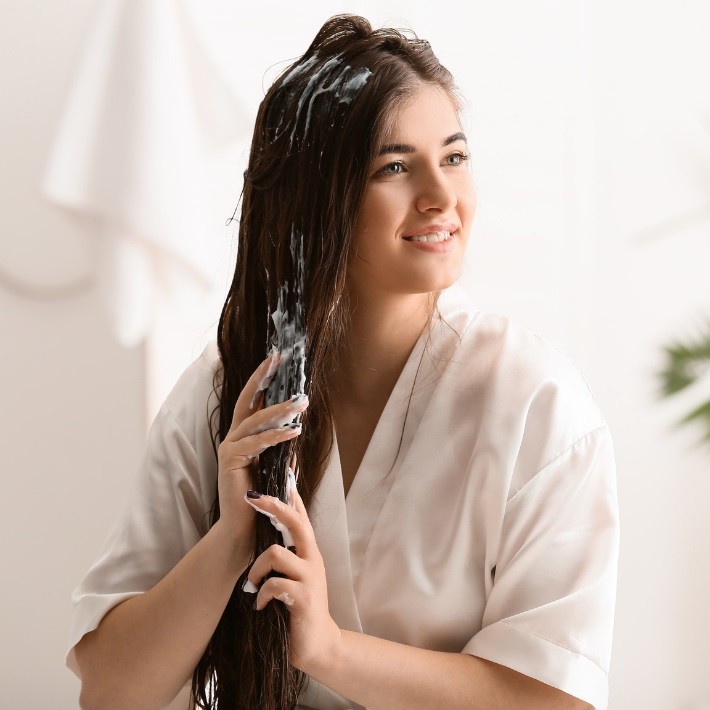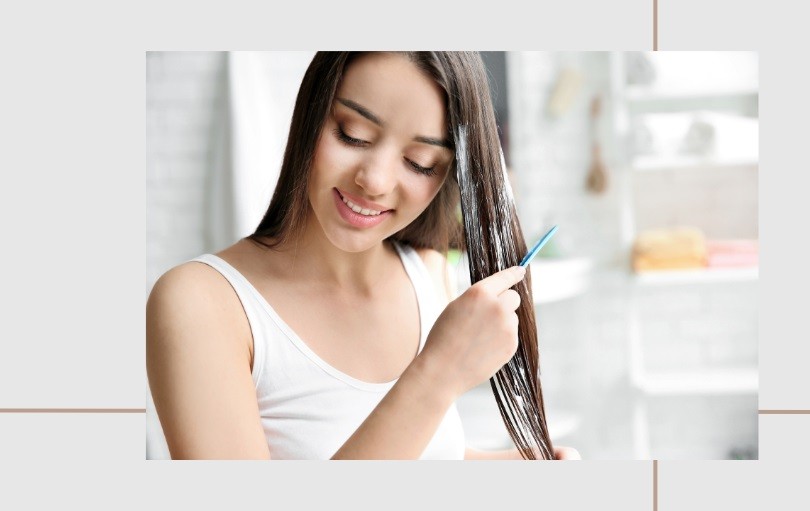Last Updated on March 28, 2025
Use a hair mask before the conditioner to maximize its benefits. A hair mask penetrates deeper into the hair shaft, so applying it first will help nourish and repair the hair from within, allowing the conditioner to seal in the moisture afterward.
Maintaining a healthy hair routine is essential to keep hair shiny, soft, and bouncy. With all the products available in the market, it can be challenging to know which order to use them in. The confusion between a hair mask and a conditioner is common.
Both are beneficial and serve different purposes, but using them improperly can lead to unfulfilled results. Thus, it’s imperative to know the correct sequence to achieve the desired outcome. We’ll discuss the correct procedure for when to use a hair mask before or after the conditioner.
Understanding The Differences Between Hair Masks And Conditioners

Related: How To Get Arctic Fox Out Of Hair?
Do You Use A Hair Mask Before Or After Conditioner?
Having soft and manageable hair is always a top priority for a lot of people, especially for those who want to maintain healthy-looking hair that radiates shine and volume. Hair masks and conditioners are popular hair treatments used to nourish, strengthen, and revitalize damaged hair.
They help repair hair strands, reduce hair breakage, and add moisture to brittle hair.
What Is A Hair Mask?
A hair mask is a deep conditioning treatment that provides intense hydration to the hair. Typically used once a week, hair masks help repair and restore hair that has been damaged by chemical treatments, heat styling, or other external factors.
Hair masks are formulated with a higher concentration of conditioning ingredients, such as vitamins, oils, and protein, compared to regular conditioners.
- Hair masks are thicker in consistency and have a longer processing time compared to conditioners.
- Hair masks contain powerful ingredients, such as keratin and collagen, to repair and restore hair health.
What Is A Conditioner?
Conditioners are hair care products that help detangle hair, improve the hair’s texture, and add moisture to the hair shaft. Unlike hair masks, conditioners are used more frequently, after shampooing, to leave hair feeling soft and manageable. They don’t provide the same level of deep conditioning as hair masks.
- Conditioners are lightweight and provide daily conditioning to maintain hair health.
- Conditioners help seal the cuticles, preventing damage and split ends.
The Purpose Of Hair Masks And Conditioners
Hair masks and conditioners have different functions in a hair care routine. Hair masks are meant to provide intense deep conditioning treatment to repair damaged hair, while conditioners provide daily support to maintain hair health. Additionally, they have different usage patterns: hair masks are used once a week, while conditioners are used more frequently, often after every shampoo.
- Hair masks provide long-term damage repair and offer lasting benefits.
- Conditioners provide instant hydration, detangling, and softness to hair.
Key Ingredients And Formulations In Hair Masks And Conditioners
The ingredients and formulation of hair masks and conditioners play a critical role in determining their effectiveness. Hair masks are formulated with antioxidants and anti-inflammatory ingredients, which protect hair integrity and repair damage. In contrast, conditioners contain emollients that work to retain moisture in hair strands.
- Key ingredients in hair masks include shea butter, argan oil, and coconut oil.
- Key ingredients in conditioners include glycerin, panthenol, and silicone.
Understanding the differences between hair masks and conditioners can help determine which hair care product is right for your hair’s specific needs. While both products are designed to improve hair health, they differ in terms of frequency of use, purpose, and formulation.
Whether you choose to use a hair mask or a conditioner, both products are essential for maintaining healthy, soft, and manageable hair.
The Correct Order Of Applying Hair Masks And Conditioners
Differences In Application Methods Of Hair Masks And Conditioners
Hair masks and conditioners serve different functions for the hair. While conditioners aim to moisturize your hair and keep it soft, hair masks provide deeper nourishment to your tresses. Here are some differences in how to apply them:
- Conditioner: It should be applied to the hair after shampooing, from the mid-lengths to the ends. Leave it on for 1-2 minutes and then rinse.
- Hair mask: It should be applied to clean, wet hair and left on for 5-15 minutes before being rinsed off. Use it once or twice a week to avoid buildup.
The Optimal Time To Apply Hair Masks And Conditioners
The time and frequency of applying hair masks and conditioners can affect the overall health of your hair. The best times to apply them are:
- Conditioner: It should be used every time you shampoo your hair.
- Hair mask: Use it once a week or twice if your hair is extremely damaged or dry. You can also use it before a special occasion to give your locks an extra boost.
How Often To Apply Hair Masks And Conditioners?
Overuse of hair masks and conditioners can result in product buildup that can make the hair look lackluster and heavy. On the other hand, skipping hair treatments regularly can leave your locks dry, brittle, and prone to breakage. Here’s how often you should use them:
- Conditioner: Use it every time you wash your hair.
- Hair mask: Use it once a week or twice a week if you have extremely dry or damaged hair.
Can You Combine Hair Masks And Conditioners?
Combining hair masks and conditioners can give you benefits that are greater than using them separately because they complement each other. Here are some ways to do it:
- Mask before conditioner: This technique is ideal for those with dry, damaged hair. Use your hair mask first for 10-15 minutes, then rinse it off and follow up with your usual conditioner applied to the mid-lengths and ends.
- Conditioner before mask: If you have fine hair, apply your regular conditioner to your hair, then rinse it off and follow up with your hair mask. Leave the mask on for five minutes, then rinse it off again.
By adhering to these guidelines, you can ensure that your hair remains healthy and vibrant, no matter what your hair type.
Related: How to Tone Your Yellow Hair to Ash Blonde?
How To Choose The Right Hair Mask And Conditioner For Your Hair Type?
Analyzing Hair Type, Texture And Porosity
Choosing the right hair mask and conditioner for your hair type can be overwhelming, but analyzing your hair type, texture, and porosity can help simplify the process. Here are the key points to consider:
- Hair type: There are three primary hair types – straight, wavy, and curly. Each hair type requires different levels of moisture and hydration. For example, curly hair is prone to dryness, and oily hair requires less hydration.
- Hair texture: Texture refers to the diameter of each hair strand, which can be fine, medium, or thick. Fine hair is fragile and requires lightweight products, while thicker hair requires more substantial products to penetrate the hair shaft.
- Hair porosity: Porosity refers to how quickly your hair absorbs and retains moisture. High porosity hair absorbs moisture quickly but loses it quickly too. On the other hand, low porosity hair repels moisture, requiring products that can penetrate the hair shaft.
Common Hair Concerns And Corresponding Masks And Conditioners
Different hair concerns require unique hair masks and conditioners to remedy their issues. Here are some common hair concerns and corresponding masks and conditioners:
- Dry hair: Dry hair requires intense moisture, so look for hair masks and conditioners with nourishing ingredients like coconut oil, argan oil, or shea butter.
- Split ends: To keep split ends at bay, look for hair masks and conditioners that contain keratin protein. It strengthens the hair, preventing future breakage.
- Dull hair: To add shine to your hair, try a nourishing mask with vitamin E and avocado. It will revitalize lackluster hair.
- Color-treated hair: Color-treated hair requires special care to prevent color fading and maintain vibrancy. Look for hair masks and conditioners that contain UV filters. They can guard against color fade.
Selecting The Right Brand Based On Your Hair Goals
There are countless hair mask and conditioner brands available in the market, making it challenging to choose the right one for your hair goals. Here’s what to keep in mind when selecting the right brand:
- Look for natural ingredients: Choose brands that use natural ingredients to prevent damage to your hair. Avoid those containing sulfates, parabens, and sodium chloride. These ingredients can damage and dry out your hair.
- Quality over quantity: Don’t be swayed by a product’s quantity or price. Look for quality products that work well with your hair and meet your hair goals.
- Brand reputation: A brand’s reputation can tell you a lot about its effectiveness. Do some prior research, and read reviews about a brand before buying their product.
Diy Hair Masks And Conditioners: Are They Safe And Effective?
Diy hair masks and conditioners are popular these days. Although they are cost-effective options, it’s advisable to assess their quality and efficacy before trying them. Here’s what you need to know:
- Quality ingredients: Diy hair masks can be safe and effective depending on the quality of ingredients used. Always use quality natural ingredients like honey, avocado, or eggs.
- Potential risks: Preparing a hair mask at home involves the risk of contamination. Ensure you sterilize all equipment used for making the mask. Also, be mindful of allergies if you’re using ingredients you’re not familiar with.
- Safety concerns: If your hair is damaged, diy hair masks may not be effective. Consult with your hairstylist or a professional before trying them.
Recap Of The Benefits Of Hair Masks And Conditioners

Achieving Optimal Hair Health And Appearance
Maintaining healthy and luscious locks can be challenging, but with the right hair care products, it’s achievable. An effective hair care routine includes using hair masks and conditioners regularly. Here are some points to keep in mind:
- Hair masks work more intensively and penetrate deeper than conditioners, providing more nourishment.
- Masks have a higher concentration of ingredients like proteins, vitamins, and minerals that fortify and repair hair from the inside out.
- Conditioners act as a protective shield, sealing the hair cuticle after washing and conditioning.
Preventing And Treating Hair Damage And Breakage
Using hair masks and conditioners can prevent hair damage and breakage caused by several factors, such as heat styling, chemical treatments, and environmental stressors. Here are a few points that can assist in preventing hair damage and breakage:
- Hair masks can repair hair damage caused by environmental stressors like UV rays and pollution by restoring essential nutrients.
- Conditioners can improve hair’s elasticity, reducing breakage and split ends, and preventing damage caused by heat styling tools.
- Avoid using harsh chemicals on your hair, and try to use natural ingredients for hair care. Ingredients like olive oil, coconut oil, and avocado oil can help restore hair health.
Boosting Hair Volume And Shine
Flat and dull hair can be frustrating when you want to achieve a voluminous and shiny look. Hair masks and conditioners can give you the bouncy and shiny locks you desire by using the following tips:
- Hair masks packed with proteins can help boost hair volume by increasing hair thickness and elasticity.
- Conditioners can improve hair shine by smoothing out the hair cuticle and protecting the hair from environmental factors that can dull its appearance.
- Ingredients like argan oil, jojoba oil, and shea butter in hair masks and conditioners can help boost hair volume and shine.
Refreshing And Nourishing Your Scalp
Hair care is not only about the hair but also includes the scalp. Proper scalp care is essential for healthy hair growth. Hair masks and conditioners can help refresh and nourish your scalp in the following ways:
- Hair masks can help remove dirt, excess oil, and build-up from the scalp, allowing it to breathe and promoting hair growth.
- Conditioners can remove any residue left behind by hair care products, preventing product build-up and providing a healthier hair environment.
- Ingredients like tea tree oil, peppermint oil, and witch hazel in hair masks and conditioners can refresh and nourish the scalp by promoting blood circulation and reducing inflammation.
Hair masks and conditioners play an essential role in maintaining and improving hair health. Including these products in your hair care routine can help prevent damage, boost hair volume and shine, and refresh and nourish your scalp.
Related: How To Wear A Beanie With Short Hair?
Frequently Asked Questions Of Do You Use A Hair Mask Before Or After Conditioner?
What Is A Hair Mask?
A hair mask is a deep conditioning treatment that nourishes and strengthens your hair.
How Often Should I Use A Hair Mask?
It is recommended to use a hair mask once a week to keep your hair healthy and moisturized.
Can I Use A Hair Mask Instead Of A Conditioner?
No, a hair mask is a deep conditioning treatment and should be used in addition to your regular conditioner.
Should I Apply A Hair Mask To Wet Or Dry Hair?
It is best to apply a hair mask to wet hair after shampooing and before conditioning.
Do I Rinse Out The Hair Mask Before Or After Conditioner?
Rinse out the hair mask after leaving it on for the recommended time, then follow with your regular conditioner.
Conclusion
After discussing the benefits of hair masks and the proper usage sequence with conditioner, it’s clear that hair masks offer numerous advantages to those who regularly incorporate them into their hair care routine. Whether you have color-treated hair or suffer from frizz, dryness, or damage, a hair mask can help to nourish and moisturize your hair, leaving it much healthier over time.
Experts recommend using hair masks before your regular conditioner, as it allows the treatment to penetrate deeper into the hair shaft, providing better results. Furthermore, it’s always important to use high-quality products that match your hair’s needs. So, the next time you’re treating your hair, consider incorporating a hair mask, and you will undoubtedly see the difference in the health and appearance of your hair.
Keep your hair healthy and shiny by trying out our tips!

